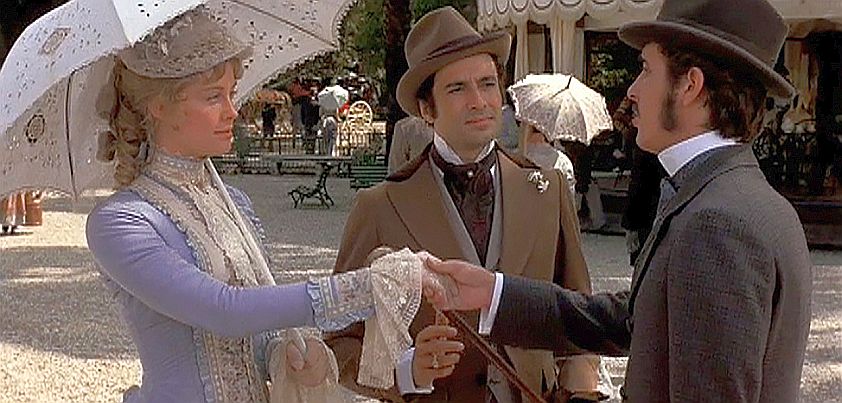 This story by Kazuo Ishiguro is a farcical satire of a man trying to save his stagnating marriage. He manipulates a mutual friend living overseas into providing company for his wife while he is away on business. The friend has achieved little in life and the husband hopes that the contrast will make his wife appreciate him more. A hilarious sequence of events unfolds as the friend tries to cover up damage he caused to the wife’s appointment book after reading unflattering entries about himself. Themes include friendship, alienation in marriage, manipulation, sacrifice, disappointment, the power of music, memories, regrets. More…
This story by Kazuo Ishiguro is a farcical satire of a man trying to save his stagnating marriage. He manipulates a mutual friend living overseas into providing company for his wife while he is away on business. The friend has achieved little in life and the husband hopes that the contrast will make his wife appreciate him more. A hilarious sequence of events unfolds as the friend tries to cover up damage he caused to the wife’s appointment book after reading unflattering entries about himself. Themes include friendship, alienation in marriage, manipulation, sacrifice, disappointment, the power of music, memories, regrets. More…
All posts by shortsonline
The Year of Spaghetti
 This story by Haruki Murakami describes how a reclusive man made 1971 his “year of Spaghetti”. After buying the necessary equipment and ingredients, he set out to cook spaghetti every day of the year. He cooked spaghetti to live and lived to cook spaghetti, comparing it to an act of revenge against his fears and feelings of meaningless isolation. Although he always eats alone, he often imagines someone standing outside about to visit. When his peace is shattered by a desperate phone call from an ex-friend’s ex-girlfriend, he declines to get involved. Themes include loneliness, self-alienation, obsession, futility. More…
This story by Haruki Murakami describes how a reclusive man made 1971 his “year of Spaghetti”. After buying the necessary equipment and ingredients, he set out to cook spaghetti every day of the year. He cooked spaghetti to live and lived to cook spaghetti, comparing it to an act of revenge against his fears and feelings of meaningless isolation. Although he always eats alone, he often imagines someone standing outside about to visit. When his peace is shattered by a desperate phone call from an ex-friend’s ex-girlfriend, he declines to get involved. Themes include loneliness, self-alienation, obsession, futility. More…
The Assignment
 This story by Saadat Hasan Manto takes place during the rioting that followed India’s Partition. Set in an “Indian” border town from which most Muslims have fled, an elderly judge underestimates the carnage to come and insists on staying. After a stroke, he becomes bed-ridden and is unable to flee. Every night, his seventeen-year-old daughter watches Muslim houses burning in the city around them. When a Sikh man repays a kindness the judge had once done for his father, we learn the reason their house has (so far) been spared. Themes include religious conflict, denial, fear, innocence, duty, betrayal. More…
This story by Saadat Hasan Manto takes place during the rioting that followed India’s Partition. Set in an “Indian” border town from which most Muslims have fled, an elderly judge underestimates the carnage to come and insists on staying. After a stroke, he becomes bed-ridden and is unable to flee. Every night, his seventeen-year-old daughter watches Muslim houses burning in the city around them. When a Sikh man repays a kindness the judge had once done for his father, we learn the reason their house has (so far) been spared. Themes include religious conflict, denial, fear, innocence, duty, betrayal. More…
Daisy Miller: A Study in Two Parts
 Henry James’s “Daisy” Miller is a young American socialite traveling through Southern Europe with her mother and younger brother. Flirtatious, independent and free-spirited, she enjoys the competing attentions of several men who she subtly manipulates to do her bidding. Her behaviour, especially going about with men unchaperoned, is scandalous by American expat community standards, resulting in gossip and her ostracization. A question in the mind of a man smitten by Daisy is whether she could possibly be as innocent as she appears. Themes include social conventions (Europe vs. America), gossip, reputation (innocence vs. immorality), double standards (male vs. female independence). More…
Henry James’s “Daisy” Miller is a young American socialite traveling through Southern Europe with her mother and younger brother. Flirtatious, independent and free-spirited, she enjoys the competing attentions of several men who she subtly manipulates to do her bidding. Her behaviour, especially going about with men unchaperoned, is scandalous by American expat community standards, resulting in gossip and her ostracization. A question in the mind of a man smitten by Daisy is whether she could possibly be as innocent as she appears. Themes include social conventions (Europe vs. America), gossip, reputation (innocence vs. immorality), double standards (male vs. female independence). More…
The Olive
 In this lesser-known story by Algernon Blackwood, a playful girl accompanying her convalescing mother on the Italian Riviera rolls an olive across a restaurant floor to see who it chooses. A young man picks it up and takes it to his room. That night, he has an erotic dream featuring the girl, naked fauns, nymphs and satyrs, and an encounter with God. He meets the girl the next day and they begin a passionate affair during which she repeats several things she said and did in the dream. Themes include fate vs. chance, love, the supernatural. More…
In this lesser-known story by Algernon Blackwood, a playful girl accompanying her convalescing mother on the Italian Riviera rolls an olive across a restaurant floor to see who it chooses. A young man picks it up and takes it to his room. That night, he has an erotic dream featuring the girl, naked fauns, nymphs and satyrs, and an encounter with God. He meets the girl the next day and they begin a passionate affair during which she repeats several things she said and did in the dream. Themes include fate vs. chance, love, the supernatural. More…